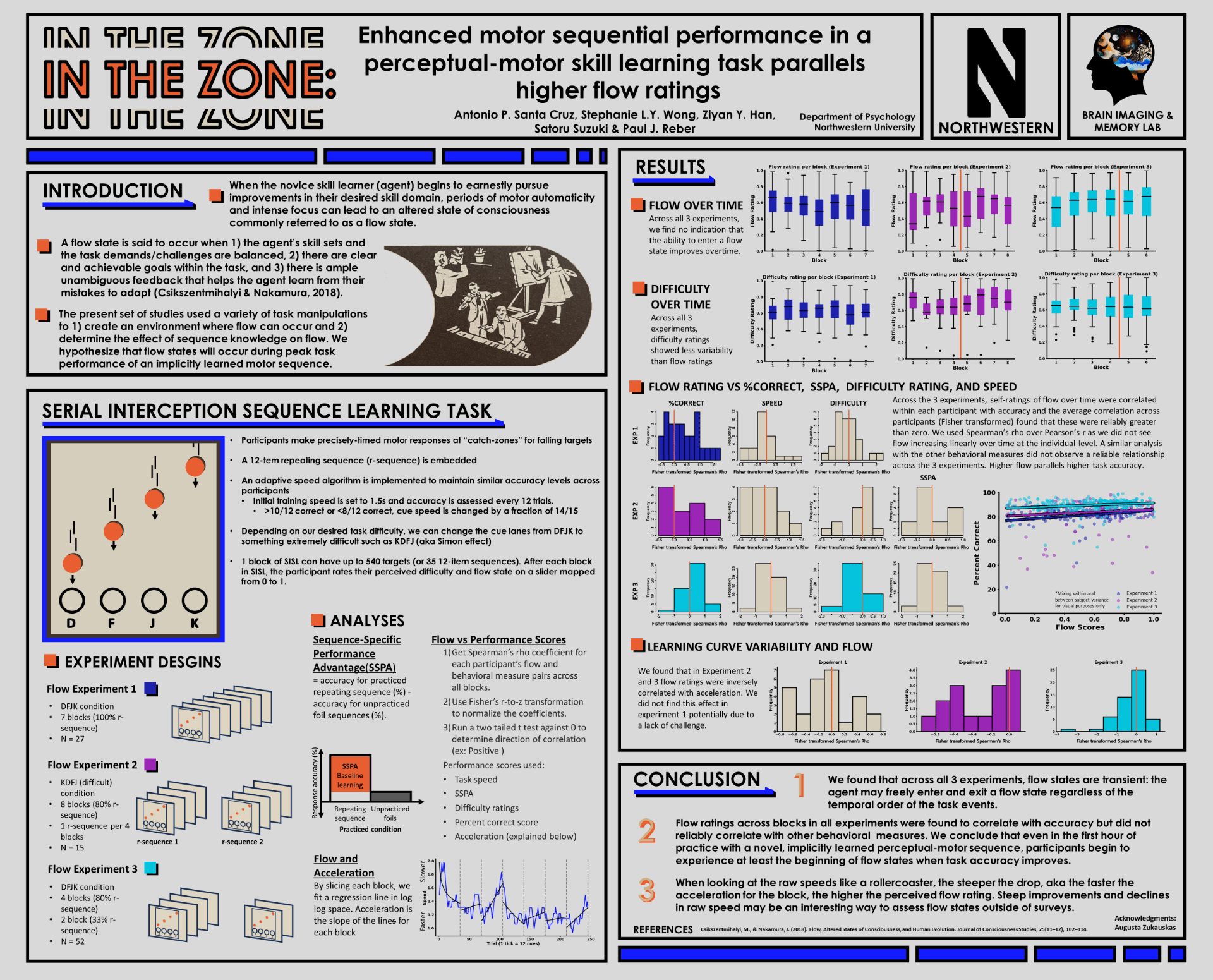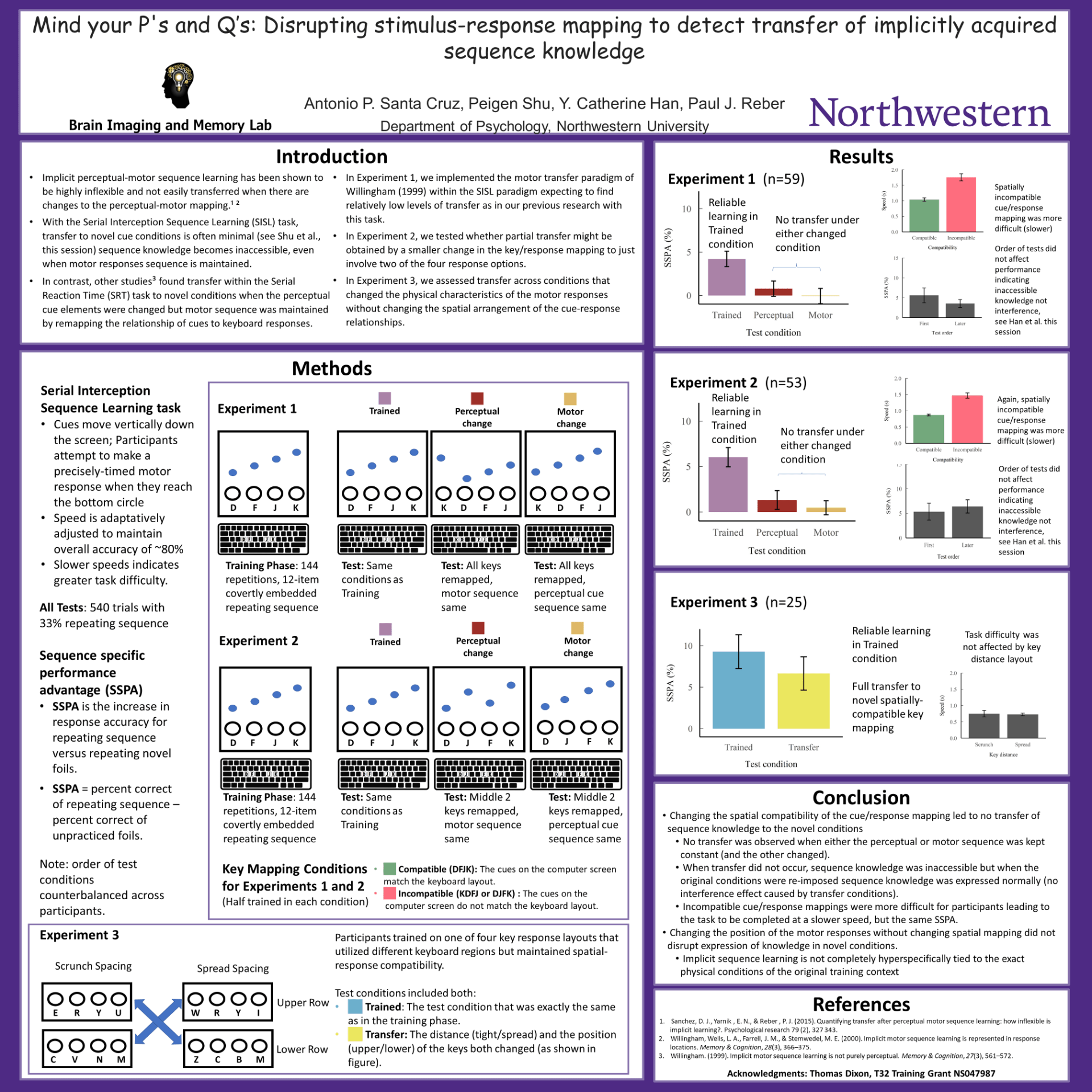
Antonio Paolo Santa Cruz
Brain, Behavior, & Cognition
Department of Psychology
Northwestern University
Office: Cresap 309
Email: antoniosantacruz2026@u.northwestern.edu
Education: The University of Texas at Dallas, Bachelor of Science in Psychology
Research interests: Explicit & Implicit memory, Motor skill learning, Flow states, Consciousness, Mental imagery (hyperphantasia & aphantasia)
About me:
My name is Antonio Santa Cruz, and I am a 3rd year PhD student in the Brain, Behavior, and Cognition program. Here at the Reberlab, we are delving into the intricacies of human perceptual-motor skill learning. When we as researchers try to unravel the mysteries of behavioral skill learning, we end up going down this amazing rabbit hole that leads us to even more challenging, abstract, and interesting questions like: Why do some motor skill tasks allow us to get in the “flow/in the zone”? Is the rate at which implicit motor skill learning occurs in the brain consistent across individuals? “Is there a limit to the learning gains humans can achieve in any one particular skill, or do these gains continue to improve indefinitely? Join us on this intellectual journey as we navigate the fascinating landscapes of motor skill learning. From questions about any aspect of motor skill learning to discussions on our latest findings, or perhaps questions about Northwestern’s psychology doctoral program and life as a PhD student, please feel free to contact me at my email above! 🧠
Work log:
4/1/2023:
My recent work has been focused on understanding how we use implicit sequential memory to achieve mastery in motor skills. Implicit memory, often given the misnomer “muscle memory”, is our brain’s ability to parse through perceptual and motor reoccurrences to strengthen processing to better account for the statistical congruences found in previous experiences with the environment. After the brain selects a motor action plan, we use our body, hands, feet, etc., in relation to the learned spatial dimensions and perceptual cues to accurately execute complex sequential movements within a task. My current research has been to train participants in an implicit motor skill learning task to determine how task general and task specific knowledge transfer to enhance the speed, automatization, and fluidity they have over the practiced skill in novel test conditions.
9/13/2021:
As of late, I have found myself drawn towards the research investigating the neural architecture of the default mode network (DMN), as well as its functions in relation to 1) imagination and 2) memory recall. The DMN is a buzzing hub of activity that switches on when our conscious attention decouples from the activity occurring in our environment. For example, if we were sitting in on an extremely dry and boring lecture, you might find that after a while your attention starts to waver, and suddenly you find yourself daydreaming. Researchers have broken down daydreaming aka mind wandering, into varying subdisciplines for further study. To name just a few: 1) future planning (remembering what clothes are in your wardrobe and creating an outfit in your head for your 8pm date night), 2) kinesthetic body movements (a ballerina visualizing a rigorous dance set as she rides the train to the recital), and 3) recalling autobiographical memories (trying to remember a specific detail from warm and happy moment you had last Christmas with the family).
The DMN is also a valuable anchor point of investigation to explore many of the beautiful properties of the brain that are often proclaimed as “defining features of our psyche”. For example, our ability to plan for the future in an unpredictable situation, explore hundreds of tree branch variations for a singular chess move, and visualize a painting before it is even on paper, are what many debate differentiate our conscious experience from that of other species. Furthermore, I believe these unique functions are the key to attacking age old philosophical questions such as: can conscious processes exist outside of the physical world? If someone asks you to visualize/imagine an apple, is this the work of an immaterial self (mind), exerting its influence over a material body(brain) to create an image in our head? Or is the brain akin to a steam engine, where neural activity at the unconscious level creates an imagery byproduct (like steam) that has no influence over the whole system?
I am extremely excited to see where this line of research takes me and what I can accomplish at Northwestern University and within the Reber Lab.
Posters

Santa Cruz, A., Shu, P., Han, Y.C., Reber, P.J. Differential transfer of sequence-specific and task-general knowledge in implicit motor sequential skill learning. Poster presented at the Cognitive Neuroscience Society Annual Meeting, San Francisco, CA (March 2023).
PDF: Antonio Santa Cruz – CNS Poster

Santa Cruz, A., Shu, P., Han, Y.C., Reber, P.J. Mind your P’s and Q’s: Disrupting stimulus-response mapping to detect transfer of implicitly acquired sequence knowledge. Poster presented at the Cognitive Neuroscience Society Annual Meeting, San Francisco, CA (April 2022).
